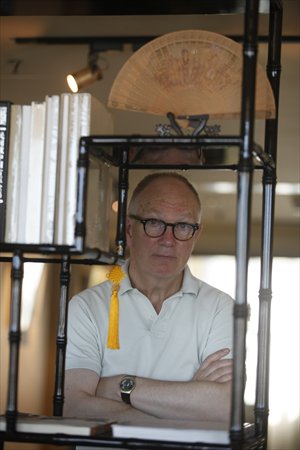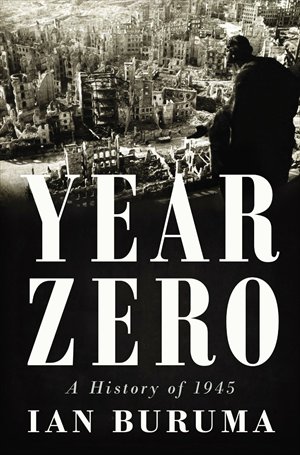An Interview with Ian Buruma

As an invited guest at this year's Shanghai Book Fair, Ian Buruma is in town to attend several cultural events. Photo: Cai Xianmin/GT
Before beginning our interview, Ian Buruma asks to stand in front of the French windows on the 27th floor of Shanghai JC Mandarin Hotel on Nanjing Road West for a while. Overlooking the architectural landscape outside, he points to the old Shanghai-style low-rise houses with yellow brick walls and red tiles surrounded by tall concrete buildings. "They were everywhere in Shanghai in the past, but you see them less and less now."
A Dutch writer, critic and academic, Buruma is widely respected in the West for his expertise on Asia, especially China and Japan, and writes about a broad range of political and cultural subjects. His articles have been published in The New York Review of Books, The New Yorker, and The New York Times.
In the 1970s, he studied Japanese cinema and theater in Japan, and in the 1980s, as a journalist based in Hong Kong, he traveled and reported from all over Asia.
"Asia is a place which constantly changes, the longer you have spent researching it, the more you have an interest in it," Buruma said.
As an invited guest at this year's Shanghai Book Fair, Buruma will attend several cultural events in town. The following are excerpts of our interview, edited for brevity.
GT: You have studied Japan and China for many years. What misunderstandings do people have about these two countries?
Buruma: There must be many. One misunderstanding about Japan is that it's a very closed society and you can never get in or make friends, which isn't really true. Once you speak a language and get to know people, it's not very closed.
A common misunderstanding that is always said about the Chinese is that they are not really interested in politics, they're only interested in business and having enough food and making money and they're not interested in changing society, which is not true at all, of course. And not all Chinese people think in the same way; people have different ideas and opinions and ways of thinking. If you have 10 Chinese people, you might have 10 different opinions.
GT: Can you comment on the way the relationship between China and Japan has changed?
Buruma: Before the 19th century, most Japanese respected China and Chinese culture, and learned a lot from China, and after the 1911 revolution in China, many Chinese students studied in Japan and many words in Chinese are from the Japanese from that period, so there was still a lot of influence going both ways. I think the relationship started to change after the World War II.
It's going to be tough because as China becomes more and more important, the Japanese feel threatened and in the long-term future, probably for the next 20 to 50 years, that is going to be a very big issue. China will be the dominant power, but how will it dominate without frightening its neighbors, and have a relationship with its neighbors that doesn't lead to conflict? Since the war (World War II), the US has played a role by being a policeman but that can't go on forever. China and Japan will have to find some way of living with each other.
Shinzo Abe, the current prime minister, who's a nationalist, wants to change the constitution to use the military in the way that other nations can. However, most Japanese, I think, are still very hesitant about that and are comfortable with the status quo.
They can leave security up to the US, and themselves concentrate on the economy and business. That's the way it's been since the war. The question is how to make changes without it leading to conflict and violence.

The forthcoming book Year Zero written by Ian Buruma
GT: You wrote a book, The Wages of Guilt: Memories of War in Germany and Japan in the 1990s. How would you describe the attitudes of these two countries toward the war?
Buruma: They're different because the history of war is different. In Germany there was a period from 1933 to 1945 under the Nazis and Hitler, which was a dictatorship, there was the Holocaust. Almost every German agrees that this was a terrible period and they should reflect on it. In Japan, it's more complicated because there was no Hitler and Nazis. It was the same government in the 1920s and 1930s as it was during the war. The war they fought in the World War II against the US and the UK was really a war of one colonial empire against other colonial empires. The one exception is the war in China. That's something that still makes Japanese feel uncomfortable because they can't justify it.
The difference with Germany is that in Japan, opinions about the war, including the war in China, depend very much on your political views. If you believe in the pacifist constitution, you tend to think that pacifism is good because it means Japan has learned its lesson, it means that Japan's war was completely wrong, so they should stick to pacifism because they should never go to war again.
But the nationalists, like the current prime minister, believe that the constitution is wrong, that they should have military power like any other great power. They argue that every country has fought wars and the Japanese war was not more wrong than other wars. It's become a completely political issue in Japan.
GT: Do you also agree that the center of the world is transforming from the US to Asia?
Buruma: There isn't just one center, now there are different centers. China is obviously becoming more and more important. It doesn't necessarily mean that the US is no longer important, but it isn't the only power. There are still many things that have to change in China. An economy can't keep growing just by building more buildings and highways. Consumers have to come more important and pollution has to be tackled and so on. The only thing you can predict is that things will change.